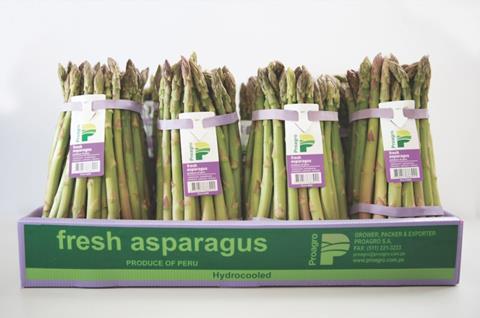
Last year was a landmark one for Peruvian company Procesos Agroindustriales (Proagro), heralding the arrival of its first commercial table grape harvest from farms in Piura.
Investment in new seedless varieties at these new farms, as well as at the company’s more established sites in Ica, has enabled it to expand its export programmes to both Europe and Asia significantly.
According to manager Andrés Jochamowitz, the company is continually evaluating new production areas for its core stable of products, which also includes asparagus, blueberries and pomegranates, while also looking to develop new product lines.
Proagro is typical of the companies benefiting from the vast new irrigation projects that are expanding Peru’s agricultural frontiers, boosting export volumes and lifting tens of thousands of people out of poverty.
But this positive message, says Jochamowitz, is not communicated strongly enough to consumers in Europe, the US and other export markets. He believes most people have little concept of the force for good that agriculture brings to developing countries, nor of the production processes that help make Peruvian fruits and vegetables among the most sustainably produced in the world.
“It’s very rare to find any part of the fresh produce supply chain that is not sustainable, since to do things otherwise would cause all sorts of problems with future harvests. Without practicing sustainable agriculture it’s impossible to think in the long term,” he tells fresh focus latin america.
The challenge, he says, is to convince consumers that they have an equally important role to play when it comes to sustainability. Taking packaging as an example, he notes that while European consumers are increasingly demanding the use of more recyclable materials, they are not necessarily prepared to pay for them.
“A consumer in the UK accepts that if they want to pack their shopping in a plastic bag at the supermarket they have to pay for it. By the same token, they need to understand that if they want their produce to be packed in recyclable materials they will have to pay for it, because the grower’s margins are simply too small for them to pick up the cost,” he says.
“The ironic thing is that the while most of the products we send to Europe in bulk are packed in recyclable materials, it is the individual consumer packs that tend to be non-recyclable.”
The same argument applies when it comes to water. Jochamowitz notes that in Peru, where water is scarce, there is no need to enforce regulations restricting its use as growers know they cannot afford to waste it.
“I recently read a study – I think it was from the Gates Foundation – that said that if first world countries were to restrict the amount of water that is flushed down the toilet it would give a significant number of children in the developing world access to clean water,” he says.
“It’s curious how some European ngos worry more about the rational use of water in agricultural areas where it has always been limited, than they do about their own countries where it is such an abundant resource. It seems to me this would be much more beneficial for the planet on which we live.”
This article is taken from Fruitnet's annual supplement Fresh Focus Latin America 2020, which is published later this month. To reserve your copy, please contact subscriptions@fruitnet.com.



